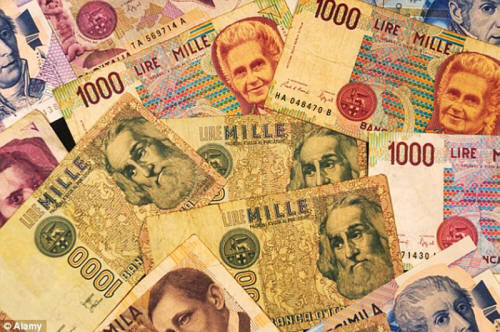|
from
WolfStreet Website and other problems have not been solved...
It's in the grip of a full-blown banking
meltdown that has the potential to rip asunder the tenuous threads
keeping the European project together. In his annual speech to the financial market, Giuseppe Vegas, the president of stock-market regulator CONSOB - a consummate insider - delivered a bleak prognosis.
The ECB's quantitative easing (QE) program has,
But it hasn't worked, he said.
Despite trillions of Euros worth of QE, Italy has continued to suffer a 30% loss in competitiveness compared to Germany during the last two decades.
And now Italy must begin to prepare itself for the biggest nightmare of all:
The German government is exerting mounting pressure on the ECB to begin tapering QE before elections in September.
So, too, is the Netherlands whose parliament today treated ECB President Mario Draghi to a rare grilling. The MPs ended the session by presenting Draghi with a departing gift of a solar-powered tulip, to remind him of the country's infamous mid-17th century asset price bubble and financial crisis.
For the moment Draghi and his ECB cohorts refuse to yield, but with the ECB's balance sheet just hitting 38.7% of Eurozone GDP, 15 percentage points higher than the Fed's, they may ultimately have little choice in the matter.
As Vegas points out, for Italy (and countries like it), that will mean having to face a whole new situation,
This is likely to be a major problem for a country that has grown so dependent on that external support.
According to the Bank for International Settlements (BIS), in 2016, international banks in particular those in Germany reduced their exposure to Italy by 15%, or over $100 billion, half of it in the last quarter of the year.
ECB intervention helped plug the shortfall, at least for a while. But the ECB has already reduced its monthly purchases of European sovereign debt instruments, from €80 billion to just over €60 billion.
As the appetite for Italian government debt falls, the yields on Italian bonds will rise. The only market participants seemingly still willing and able (for now) to increase their purchase of Italian debt are Italian banks.
Over a two-month period, Italian banks increased their holdings of Eurozone government debt by €20 billion, with €12.3 billion of newly conjured funds poured into Italian debt alone, according to a joint study by the ECB and Jefferies International.
It's the highest increase since 2015, bringing Italian banks' total holdings of Italian government debt to an eye-watering €235 billion. When rates begin rising on that debt, those same banks, many of which are already verging on insolvency, will begin bleeding new losses.
This is a ticking financial time bomb...
As the FT recently reported, just about every solution hurled at Italy's financial crisis has come to naught. That seemingly includes the latest plan-B which essentially involved securitizing billions of Euros of toxic debt and spreading it as far and wide as possible, with the assistance of Wall Street banks.
According to the FT, that plan has already "floundered."
In the meantime, Brussels continues to dither over how to proceed with the bailout/bail-in of Italy's most bankrupt big bank, Monte dei Paschi di Siena, which just announced new quarterly losses of €169 million.
Other major banks, most notably Banco Popolare di Vicenza (BPVI) and Veneto Banca, are in similar dire straits.
Once again, Italy's regulators are urging caution over applying the EU's bail-in rules to the exact letter of the law.
In his address, Vegas proposed introducing a safeguard threshold of €100,000 Euros for the banks' bondholders, many of whom are ordinary Italian citizens, with combined holdings worth some €200 billion, who were told by the banks that their bonds were a secure investment.
Not any more.
To get his point across, he issued a barely veiled threat in Frankfurt and Brussels' direction - that of Italy's exit from the Eurozone, a prospect that should not be altogether discounted given the recent growth of anti-euro sentiment and rising political instability in Italy.
So he threatened:
That's the ultimate threat:
Let others pick up the pieces of the Eurozone...
|




